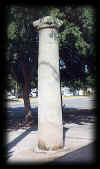Augusta, Georgia
| City of Augusta | |||
|---|---|---|---|
| — City — | |||
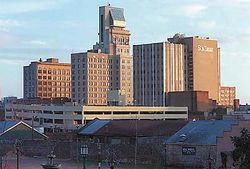 |
|||
|
|||
| Nickname(s): The Garden City , AUG, Disgusta |
|||
| Motto: We Feel Good![1] |
|||
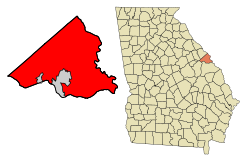 |
|||
| Coordinates: | |||
| Country | United States | ||
| State | Georgia | ||
| County | Richmond County | ||
| Established | 1736[2] | ||
| City-county consolidation | 1996[2] | ||
| Government | |||
| - Mayor | Deke Copenhaver | ||
| - Mayor pro tem | Alvin Mason | ||
| - Administrator | Frederick L. Russell | ||
| Area | |||
| - City | 306.5 sq mi (793 km2) | ||
| - Land | 302.1 sq mi (782 km2) | ||
| - Water | 4.3 sq mi (11.3 km2) | ||
| Elevation[3] | 136 ft (45 m) | ||
| Population (2008 est.) | |||
| - City | 190,782 | ||
| - Density | 648/sq mi (250/km2) | ||
| - Metro | 534,218 | ||
| Time zone | EST (UTC-5) | ||
| - Summer (DST) | EDT (UTC-4) | ||
| Area code(s) | 706, 762[4][5] | ||
| Website | AugustaGA.gov | ||
Augusta (also known as Augusta-Richmond County) is a consolidated city in the U.S. state of Georgia. The city of Augusta and Richmond County governments merged operations in 1996; as of 2008, the Augusta-Richmond County estimated population was 194,149,[6] not counting the unconsolidated cities of Hephzibah and Blythe.
Augusta is the principal city of the Augusta-Richmond County Metropolitan Statistical Area, which as of 2008 had an estimated population of 534,218. Augusta is thus the second largest city in Georgia and the second-largest metro area in the state after Atlanta, as well as the 113th largest city in the U.S.[7] Internationally, Augusta is best known for hosting The Masters golf tournament each spring, and for being the hometown of funk/soul singer James Brown.
Contents |
History
Augusta was first used by Native Americans as a place to cross the Savannah River, because of Augusta's location on the fall line. In 1735, two years after James Oglethorpe founded Savannah, he sent a detachment of troops on a journey up the Savannah River. He gave them an order to build at the head of the navigable part of the river. The job fell into the hands of Noble Jones, who created the settlement to provide a first line of defense against the Spanish and the French. Oglethorpe then named the town Augusta, in honor of Princess Augusta Of Saxe-Gotha The Princess Of Wales, daughter-in-law of King George II of Great Britain and mother of King George III of Great Britain. Augusta was the second state capital of Georgia from 1785 until 1795 (alternating for a period with Savannah, the first).
Geography
Augusta is located on the Georgia/South Carolina border, about 150 miles (241 kilometers) east of Atlanta. The city is located at (33.470, -81.975)[8].
According to the United States Census Bureau, the Augusta-Richmond County balance has a total area of 306.5 square miles (793.8 km²). 302.1 square miles (782.5 km²) of it is land and 4.3 square miles (11.3 km²) of it (1.42%) is water.
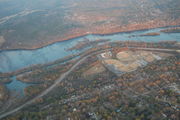
Augusta is also located about halfway up the Savannah River on the fall line, providing a number of small falls on the Savannah River. The city itself marks the end of a navigable waterway for the river. The Clarks Hill Dam is also built on the fall line near Augusta, forming Lake Strom Thurmond, also known as Clarks Hill Lake. Further downstream, near the border of Columbia County, is the Stevens Creek Dam, which generates hydroelectric power, and still further, the Augusta Diversion Dam which marks the beginning of the Augusta Canal and channels Savannah River waters into the canal.[9]
Climate
According to Köppen classification, Augusta has a humid subtropical climate. The city experiences mild winters and a humid summer. The average high temperature for the summer months is 90.6 °F (32.6 °C). Summer daytime temperatures can soar to 100 or above. The average low temperature is 67.8 °F (19.9 °C). The average high temperature for the winter months is 58.9 °F (14.9 °C); the average low temperature is 34.4 °F (1.3 °C).
| Climate data for Augusta | |||||||||||||
|---|---|---|---|---|---|---|---|---|---|---|---|---|---|
| Month | Jan | Feb | Mar | Apr | May | Jun | Jul | Aug | Sep | Oct | Nov | Dec | Year |
| Source: The Weather Channel[10] | |||||||||||||
Demographics
| Historical populations | |||
|---|---|---|---|
| Census | Pop. | %± | |
| 1800 | 2,215 |
|
|
| 1810 | 2,476 | 11.8% | |
| 1840 | 6,403 |
|
|
| 1850 | 9,448 | 47.6% | |
| 1860 | 12,493 | 32.2% | |
| 1870 | 15,389 | 23.2% | |
| 1880 | 21,891 | 42.3% | |
| 1890 | 33,300 | 52.1% | |
| 1900 | 39,441 | 18.4% | |
| 1910 | 41,040 | 4.1% | |
| 1920 | 52,548 | 28.0% | |
| 1930 | 60,342 | 14.8% | |
| 1940 | 65,919 | 9.2% | |
| 1950 | 71,508 | 8.5% | |
| 1960 | 70,626 | −1.2% | |
| 1970 | 59,864 | −15.2% | |
| 1980 | 47,532 | −20.6% | |
| 1990 | 44,639 | −6.1% | |
| 2000 | 195,182 | 337.2% | |
| Est. 2008 | 194,149 | −0.5% | |
| Population 1800-2000.[11] | |||
In the official 2000 census, Augusta-Richmond County had 195,182 people and 73,920 households[12]. The population density was 616.6 people per square mile (249.4/km²)(2000)[13]. There were 80,481 housing units at an average density of 266.4/sq mi (102.8/km²). The racial makeup of the balance was 50.37% Black or African American, 44.91% White, 0.27% Native American, 1.52% Asian, 0.12% Pacific Islander, 1.02% from other races, and 1.78% from two or more races. Hispanic or Latino of any race were 2.79% of the population.
There were 72,307 households out of which 33.5% had children under the age of 18 living with them, 41.5% were married couples living together, 20.8% had a female householder with no husband present, and 33.3% were non-families. 27.9% of all households were made up of individuals and 8.5% had someone living alone who was 65 years of age or older. The average household size was 2.55 and the average family size was 3.13.
In the balance the population was spread out with 26.8% under the age of 18, 12.0% from 18 to 24, 29.9% from 25 to 44, 20.4% from 45 to 64, and 10.9% who were 65 years of age or older. The median age was 32 years. For every 100 females there were 93.2 males. For every 100 females age 18 and over, there were 89.7 males.
The median income for a household in the balance was $37,231, and the median income for a family was $45,372. Males had a median income of $32,008 versus $23,988 for females. The per capita income for the balance was $19,558. About 13.2% of families and 16.8% of the population were below the poverty line, including 24.1% of those under age 18 and 12.5% of those age 65 or over.
Economy
In recent years, Augusta has become a center of medicine, biotechnology, and military. The Medical College of Georgia, the state's only public health sciences graduate university, employs over 7,000 people. Along with University Hospital, the Medical District of Augusta employs over 25,000 people and has an economic impact of over $1.8 billion. [14]
Along with the Medical College of Georgia, the city's three largest employers include the Savannah River Site (a Department of Energy nuclear facility) and the U.S. Army Signal Center at Fort Gordon.
Companies that have facilities, headquarters or distribution centers in Augusta include Electrolux (US headquarters), CareSouth, T-Mobile, Solo Cup Company, Automatic Data Processing, International Paper, NutraSweet, Teleperformance, E-Z-GO, Elanco, Club Car (Worldwide Headquarters), John Deere, Procter & Gamble, Kellogg's, Delta Air Lines baggage call center [15], and upstart clothing company Whitewear founded by Augusta native Stacy B. White.
Sports
Teams
Augusta is currently home to the Augusta Greenjackets minor league baseball club. The team began play in 1988 as the Augusta Pirates, affiliated with the Pittsburgh Pirates. The Greenjackets were later affiliated with the Boston Red Sox and currently are with the San Francisco Giants. The team is owned by Cal Ripken Jr.
The city's ECHL hockey team, the Augusta Lynx, disbanded in December 2008.
The Southern Professional Hockey League will expand to Augusta starting in the 2010-2011 season. The name, the result of a "Name the Team" contest, was announced on March 13th, 2010. [16]
| Club | Sport | League | Venue |
|---|---|---|---|
| Augusta GreenJackets | Baseball | South Atlantic League | Lake Olmstead Stadium |
| Augusta River Hawks | Ice Hockey | Southern Professional Hockey League | James Brown Arena |
Tournaments

The city’s famous golf course, the Augusta National Golf Club, hosts the first major golf tournament of each year, The Masters. This tournament is one of the most prestigious in the sport and is part of the Professional Golfers' Association’s Grand Slam. The best professional and amateur golfers in the world come to Augusta during the first full week of April every year. The grounds of Augusta National are known as the most pristine in all of golf. The course was ranked in 2009 as the best golf course in the world. The city is also a hotbed for disc golf. The Augusta Top Gun Series is a series of tournaments sanctioned by the Professional Disc Golf Association. These tournaments are held at various venues in Augusta, including Pendleton King Park and Lake Olmstead. Also, Augusta hosted the 2006 Professional Disc Golf World Championships. Along with Pendleton King and Lake Olmstead, 2 courses in N. Augusta, SC were used for the tournament. 299 disc golfers from around the world attended the event with Ken Climo winning the tournament and his 12th world championship.
Augusta is also the host of the World's Richest Drag Boat Race held on the Savannah River (Augusta Southern Nationals). The race is part of the IHBA Lucas Oil Drag Boat Racing Series and is sanctioned by the International Hot Boat Association (held on July 18-20). The event benefits the Augusta Chapter of the Georgia Special Olympics. Over one hundred racing teams from twenty-five states will compete for $140,000 in purse and prizes as they try to beat the record of 252.94 MPH in the ‘World’s Richest Drag Boat Race”!
Also, the 2009 Science Olympiad National tournament was held at Augusta State University, May 15-16
Parks and recreation

- Riverwalk Augusta — riverfront park along and on top of city's levee
- Augusta Common — green space linking Broad St. to Reynolds St., with statue of James Oglethorpe
- Augusta Canal — historic canal with bike/pedestrian path
- Aqueduct Park[17] — lagoon converted into park and swimming site by volunteers
- Phinizy Swamp Nature Park — wetlands park with pedestrian/bike paths and boardwalks
- Diamond Lakes Regional Park — park in south Richmond County
- Savannah Rapids Pavilion
- Brookfield Park - public park featuring a playground, putting green, pedestrian/bike path, and a fountain in which children can play
Government
In 1995, the citizens of Augusta and unincorporated Richmond County voted to consolidate their city and county governments. Citizens of Hephzibah and Blythe, Georgia, also located in Richmond County, decided to maintain separate governments. Augusta and Richmond County's consolidation took effect January 1, 1996, with the city and county merging operations. The consolidated government consists of a mayor and 10 commissioners. Eight commissioners represent specific districts, while the other two represent super districts that represents half of the county's population respectively.[18]
After a history of political division, politics in Augusta-Richmond County have become progressively more issue-oriented. [19][20]
Education
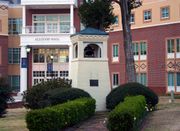
Colleges and universities
- Augusta State University (public state university)
- Augusta Technical College (public technical college)
- Medical College of Georgia (public medical college)
- Paine College (private, Methodist historically black college)
K-12 schools
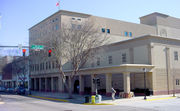
Public K-12 schools in Augusta are managed by the Richmond County School System. The system has eight high schools, 10 middle schools, 36 elementary schools, four magnet schools, and three other-format schools.
Private schools in Augusta include Aquinas High School, Episcopal Day School, St. Mary on the Hill School, Curtis Baptist School, Gracewood Baptist First Academy, Alleluia Community School, New Life Christian Academy, and Westminster Schools of Augusta. Augusta Christian School and Augusta Preparatory Day School serve Augusta, but are located in neighboring Martinez, Georgia. A selection of magnet schools in Augusta are C.T. Walker Traditional Magenet School, A.R. Johnson, and Davidson Fine Arts.
Infrastructure
Transportation
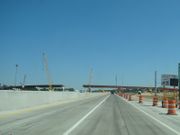
Augusta is linked to Atlanta, Georgia to the west and Columbia, South Carolina to the east by Interstate 20. Interstate 520 (Bobby Jones Expressway) runs from I-20 Exit 196 through Augusta's western and southern suburban areas, eventually crossing the Savannah River to South Carolina where it becomes the Palmetto Parkway. It was once under construction, but Palmetto Parkway is finished and is connected to I-20 where it ends.
U.S. and state routes:
 Interstate 20
Interstate 20 Interstate 520 — Bobby Jones Expwy.
Interstate 520 — Bobby Jones Expwy. U.S. Highway 1 — Deans Bridge Rd. (from Jefferson County line to Gordon Hwy.), Gordon Hwy. (from Deans Bridge Rd. to state line)
U.S. Highway 1 — Deans Bridge Rd. (from Jefferson County line to Gordon Hwy.), Gordon Hwy. (from Deans Bridge Rd. to state line) U.S. Highway 25 — Peach Orchard Rd. (entire length), Gordon Hwy. (from Peach Orchard Rd. to state line)
U.S. Highway 25 — Peach Orchard Rd. (entire length), Gordon Hwy. (from Peach Orchard Rd. to state line) U.S. Highway 78 /
U.S. Highway 78 /  U.S. Highway 278 /
U.S. Highway 278 /  State Route 10 — Gordon Hwy.
State Route 10 — Gordon Hwy. Georgia State Route 4 — follows U.S. Highway 1 from Jefferson County line to Gordon Hwy., leaves Georgia at 13th St. bridge
Georgia State Route 4 — follows U.S. Highway 1 from Jefferson County line to Gordon Hwy., leaves Georgia at 13th St. bridge Georgia State Route 28 — various roads, including John C. Calhoun Expwy. and Washington Rd.
Georgia State Route 28 — various roads, including John C. Calhoun Expwy. and Washington Rd. Georgia State Route 56 — Mike Padgett Hwy.
Georgia State Route 56 — Mike Padgett Hwy. Georgia State Route 88 in south Richmond County
Georgia State Route 88 in south Richmond County Georgia State Route 104 — River Watch Pkwy.
Georgia State Route 104 — River Watch Pkwy. State Route 383 — Jimmie Dyess Pkwy.
State Route 383 — Jimmie Dyess Pkwy. Fall Line Freeway
Fall Line Freeway
 Savannah River Parkway
Savannah River Parkway
Augusta is served by city transit service Augusta Public Transit (APT), but the main mode of transportation within the city is by car. The city has 2 airports: Augusta Regional Airport featuring commercial air service by USAirways, Delta Air Lines and American Airlines, and a smaller airport for private and chartered planes, Daniel Field Airport. Augusta is also served by a number of Taxi companies. There was a proposal for a possible four mile long Trolley system that would run through the city's Downtown district.
Sister cities
See also
|
|
References
- ↑ No Action on Tax Rate, Commission Seat; New Slogan; Ambulance Service Adopted (NBC Augusta)
- ↑ 2.0 2.1 Visitor Info - Augusta History
- ↑ Visitor Info - Augusta Facts
- ↑ Get your digits straight 040306 - The Augusta Chronicle
- ↑ 762 on way to phone near you 050108 - The Augusta Chronicle
- ↑ http://www.census.gov/popest/cities/tables/SUB-EST2007-01.csv
- ↑ "State boards lack Augusta representation," Augusta Chronicle, [1]
- ↑ "US Gazetteer files: 2000 and 1990". United States Census Bureau. 2005-05-03. http://www.census.gov/geo/www/gazetteer/gazette.html. Retrieved 2008-01-31.
- ↑ http://chronicle.augusta.com/stories/062903/pav_pavey.shtml Officials consider relicensing Augusta Canal, Augusta Chronicle, June 28, 2003
- ↑ "Average Weather for Augusta, GA - Temperature and Precipitation". http://www.weather.com/weather/wxclimatology/monthly/graph/USGA0032. Retrieved July 29, 2008.
- ↑ "Census Of Population And Housing". U.S. Census Bureau. http://www.census.gov/prod/www/abs/decennial/index.htm. Retrieved 2008-11-02.
- ↑ "Richmond County Quick Facts from the U.S. Census Bureau". U.S. Census Bureau. http://quickfacts.census.gov/qfd/states/13/13245.html. Retrieved 2009-09-14.
- ↑ "Richmond County Quick Facts from the U.S. Census Bureau". U.S. Census Bureau. http://quickfacts.census.gov/qfd/states/13/13245.html. Retrieved 2009-09-14.
- ↑ HOME | AugustaTomorrow.com
- ↑ [2]
- ↑ http://thesphl.com/view/thesphl/news/news_11400
- ↑ Public clears debris, brush 061208 - The Augusta Chronicle
- ↑ Augusta Richmond County Official Website-District Maps
- ↑ http://chronicle.augusta.com/stories/112698/met_098-3062.001.shtml
- ↑ http://chronicle.augusta.com/stories/110598/met_124-7096.shtml
External links
- AugustaGA.gov — official website
- Augusta Metropolitan Convention and Visitors Bureau
- Augusta Economic Development Authority Homepage
- Augusta Tomorrow
- Downtown Augusta Alliance
- Downtown Development Authority
|
|||||||||||||||||||||||||||||||||||||||||||||||||||||||||||||||||||||||||||||||||||

